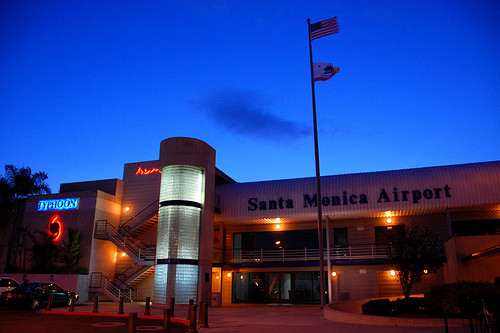When the Santa Monica Airport Commission discussed a set of leasing guidelines designed to clarify rules for aviation businesses at Santa Monica airport last week, airport critics and supporters had some common ground: no-one likes the rules.
Aviation advocates said the rules discriminate against businesses catering to pilots and violate requirements for maintaining operations at the airport. Airport critics said the rules provide the airport director with too much authority to waive requirements and do too little to increase safety for nearby residents.
The new standards include insurance rules, security requirements, application procedures, general operator requirements and specialized rules for individual types of businesses. Commercial service providers such as fixed base operators (FBO), aircraft charter/air taxis, flight training schools, aircraft maintenance and repair stations, self-service fuel pumps, aircraft management services, air transportation arrangers, aircraft sales operators and other aeronautical services would be covered under the rules. The guidelines are an addendum to existing leasing rules and are part of a larger revision to the way leases are handled at the airport.
“This is nothing new, this is a further explanation of what is in the Consent Decree,” said Commissioner Lael R Rubin. “For some people seeing the length and breadth of what this document is, it may seem this is something new.”
The Consent Decree allows City Hall to close the airport in 2028, shorten the runway and resolved several ongoing legal disputes between the city and the FAA. Under the decree, the City is required to offer aeronautical businesses three-year lease terms and adhere to FAA standards that make the airport available to pilots on reasonable terms. Staff said the new Minimum Standards are in compliance with those rules.
Airport director Stelios Makrides said meeting the minimum standards didn’t guarantee a lease would be issued. He said the standards were the first step in a leasing process that would involve the Commission, City Manager and possibly the City Council depending on the terms proposed and kind of business. He said his role was to determine the operational requirements for a business and retaining some flexibility in the applicability of the standards would allow staff to address the unexpected.
Commissioner Chris Waller said he wanted staff to pay particular attention to rules governing on-demand flight operations that function like Uber or Bird for aircraft because their ground-based counterparts have shown they will exploit rules, or the lack thereof, to their benefit.
“They’ll take any loophole possible,” he said. “They just go for profits and growth and don’t care about the community when they start blowing up.”
Staff began discussing the proposals in January of this year by sending notices to stakeholders. They conducted seven meetings in February and asked for all comments to be received by March 9.
However, both sides claimed the process moved too quickly and said additional time should be provided for public analysis and comments. The Commission said they would extend the public comment period for two weeks and scheduled a second discussion at their July 23 meeting where the public will have another chance to comment.
Members of the public that would like to comment are asked to email airport@smgov.net. Staff said comments unrelated to the Minimum Standards will not be discussed during this process.
editor@www.smdp.com









